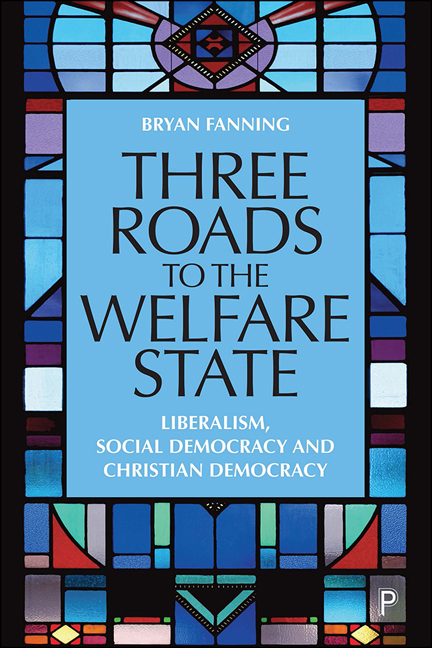Book contents
- Frontmatter
- Contents
- About the author
- Preface
- 1 Three roads
- 2 The invention of laissez faire
- 3 Utopian socialism
- 4 Reform liberalism and technocracy
- 5 Catholic social thought versus modernity
- 6 The case for social democracy
- 7 Social engineering versus democracy
- 8 The rise of neoliberalism
- 9 European Christian democracy
- 10 Legacies
- Notes
- Select bibliography
- Index
9 - European Christian democracy
Published online by Cambridge University Press: 13 May 2022
- Frontmatter
- Contents
- About the author
- Preface
- 1 Three roads
- 2 The invention of laissez faire
- 3 Utopian socialism
- 4 Reform liberalism and technocracy
- 5 Catholic social thought versus modernity
- 6 The case for social democracy
- 7 Social engineering versus democracy
- 8 The rise of neoliberalism
- 9 European Christian democracy
- 10 Legacies
- Notes
- Select bibliography
- Index
Summary
Very late in life in 1943 H.G. Wells wrote an anti-Catholic pamphlet that called, among other things, for the bombing of Rome. ‘Even in comparison with Fascism and the Nazi adventure,’ he wrote,’ Catholicism is a broken and utterly desperate thing, capable only of malignant mischief in our awakening world.’ This was pretty much the Catholic view of the triumphant modernity professed by Wells in his novels and polemics. Gabriel Almond, an American political scientist wrote, in a 1948 assessment of the post-war European political landscape, that ‘to the Church-backed Christian democratic movements there flocked practically all that part of Western Europe which was neither Marxist, nor ‘liberal’ in the classic meaning of the term.’ This Christian democratic wave was essentially the product of a period of catharsis and reconstruction which followed the Second World War.
Christian Democracy very quickly became a prominent political force in several European countries, though not in Scandinavia or Great Britain. It became influential in European countries with large Catholic populations, other than Spain and Portugal where totalitarian regimes remained in control. By 1948, Christian democrat political parties had become dominant or politically prominent in Austria, Belgium, France, Italy, the Netherlands and in the Federal Republic of Germany following its establishment in 1949. Ideas and approaches associated with Christian democracy subsequently spread to Latin America and to former Eastern Bloc countries including Poland, Romania, Hungary, Slovakia and Lithuania after these became democracies. In western Europe, it filled a political vacuum left by the defeat of totalitarianism. In the immediate post-Second World War era Christian democrats in Germany and elsewhere could present themselves as harbingers of a new democratic era and, with the onset of the Cold War, as enemies of communism. The post-war Christian democratic project was one that supported religious pluralism and Western democratic values. It looked West in opposition to the Soviet-controlled Eastern Bloc.
This chapter examines the convergence of religious, political and economic responses to pre-1945 totalitarianism that came to constitute a distinct world of welfare capitalism. The influence of religious ideas is examined through a focus on the intellectual journey of Jacques Maritain (1882–1973), the most prominent Catholic theologian and political philosopher prior to the Second World War and during its aftermath.
- Type
- Chapter
- Information
- Three Roads to the Welfare StateLiberalism, Social Democracy and Christian Democracy, pp. 183 - 202Publisher: Bristol University PressPrint publication year: 2021



